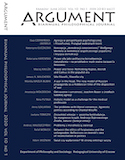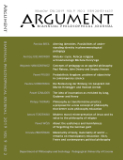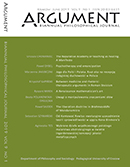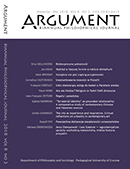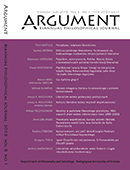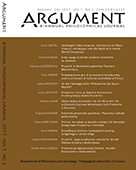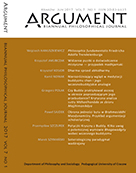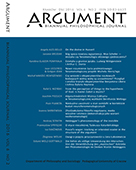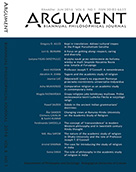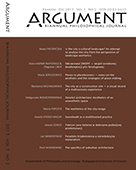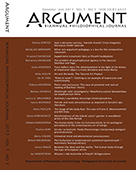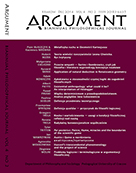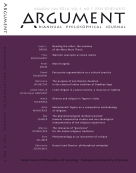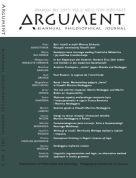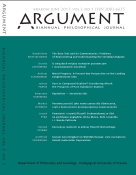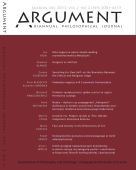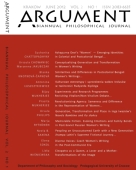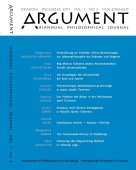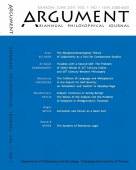e-ISSN 20841043
Kraków, June 2016, volume 6, number 1
SPIS TREŚCI

Temat wiodący numeru:
Akademickie religioznawstwo w Azji Południowej
Tom poświęcony pamięci Profesora Josepha T. O’Connella
Redaktor koordynujący: Marzenna Jakubczak
Współredaktorzy: Asha Mukherjee & Åke Sander
 Wprowadzenia redaktorów
Wprowadzenia redaktorów
Introduction to the issue (Marzenna JAKUBCZAK) (5-9)
Foreword to special volume in the memory of Professor Joseph T. O’Connell (Asha MUKHERJEE) (11-13)
A brief overview of the research interest and works of Joseph T. O’Connell (Åke SANDER) (15-18)
Pożegnania
Amir HUSSAIN, Professor Joseph T. O’Connell: A remembrance (19-20)
Słowa kluczowe
(Słowa kluczowe wkrótce)
Artykuły i rozprawy
Arvind SHARMA, The case for introducing the study of religion in India (21-29)
Abstrakt
The author o ers a brief report of introducing the study of religion in India since 194 While doing so he refers to the Constitution of India, so-called Nehruvian Consensus, the Kothari Commission which made an important distinction between ‘religious education’ and ‘educa- tion about religion’, as well as several other bodies responsible for national policy on education, which gave a unique shape of Indian secularism.
Słowa kluczowe: religious education in India; education about religion; religious pluralism; ethical vs. religious values; religion and nationalism; secularism
Asha MUKHERJEE, Comparative religion as an academic study in contemporary India (31-38)
Abstrakt
The paper aims to argue that the di erent forms of ‘academic study of religion’ in the West hardly have core characteristics on which there is a consensus of scholars. Moreover, it may not be the only way of doing Academic Study of Religion. In Indian tradition, in its own way there have been religious studies. Religion is a way of living. The presence of a large diverse religious population constitutes myriad human exemplars of and witnesses to what it means to be religious and to act religiously. It furnishes a diversity of backgrounds, sensitivities and language competences on the part of Indians who choose to be trained as scholars in the eld. Typically for an Indian, ‘living religion’ is more important than studying, describing, or know‐ ing religion. One does not have the time or money for such ‘luxuries’; religion is a ‘bracketed existence’ in normal circumstances, but in crises it is the basic or fundamental identity of an individual. Further, in the Indian context only the serious academic study ‘comparative reli‐ gion’ has relevance, and this brings an interesting methodology to the study. Contemporary attempts and distinctive contributions on comparative methodology of study of religion would be discussed as well as how far its application in the Asian context would be possible. The paper concludes by answering what it means to do ‘comparative religion’ of an authentic sort among diverse pressures, expectations, challenges and opportunities.
Słowa kluczowe: study of religion; Indian religions; philosophy of religion; religious studies
Abrahim H. KHAN, Tagore and the academic study of religion (39-53)
Abstrakt
Rabindranath Tagore (1861–1941), at about the start of the nineteenth century, was advocat‐ ing that the study about religion has to be included in university‐level education in the East. The university he envisioned and founded (Visva‐Bharati) included in its curriculum such a study. Shortly a er India’s regaining independence in 1947 and becoming a secular state, that institution was inaugurated as a central university with an advanced institute for philosophy and the study of religion. This essay answers whether his understanding of studying religion would accommodate the approach to the academic study of religion associated with the mod‐ ern Western research university. It also inquires the extent that the curriculum for the study of religion at Visva‐Bharati evidences such an approach. The answers it advances draw primarily on his two essays, Eastern University and Hindu University, which o er his vision of univer‐ sity level education; on commissioned reports for higher level education in the new India as a secular state; on developments in the academic study of religion in the West, especially the United States; on the relatively recent revised curriculum for such a study at Visva‐Bharati University; and on ideas of social imaginary and the comparative study of religion articulated by Western scholars.
Słowa kluczowe: Rabindranath Tagore; Visva‐Bharati; comparative study of religions; social imaginary; human person; truth; dharmic traditions; rational inquiry; modern research university
Sonia SIKKA, The role of philosophy in the academic study of religion in Indian (55-79)
Abstrakt
Joseph T. O’Connell drew attention to the relative scarcity of academic work on religion in South Asia, and o ered as a plausible explanation for this state of a airs the tension between secular and religio‐political communal interests. This paper explores the potential role of phi‐ losophy as an established academic discipline within this situation, in the context of India. It argues that objective study, including evaluation, of the truth claims of various religious traditions is an important aspect of academic as opposed to confessional engagement with religion, and that philosophy in India is especially well suited to undertake such re ection and to provide corresponding education. Unlike Western countries, philosophy and religion were never clearly separated in India and did not evolve in tension with one another. The history of Indian philosophy therefore includes and is included within the history of its ‘religions’, in a way that makes philosophical examination of the truth claims of Indian religions internal to those religions themselves. By tracing this history, the discipline of philosophy can help to unsettle the idea of religion as a matter of xed dogma. It can also continue the procedure of interpreting and evaluating metaphysical and epistemological theses that has been an intrinsic component of Indian religious thought for most of its history.
Słowa kluczowe: Joseph T. O’Connell; philosophy of religion; religious pluralism; diversity of faith; religion and ideology; Hinduism; comparative study of religion
Lori G. BEAMAN, A focus on getting along: respect, caring and diversity (81-91)
Abstrakt
Drawing inspiration om Joseph T. O’Connell’s work on socio‐cultural integration, this pa‐ per connects the notion of ‘deep equality’ with two broad lessons that can be taken om O’Connell’s approach that pertain to the study of religious diversity in contemporary life. The rst is the recognition of the amorphous nature of religious identity, and the second is the necessity to search for models of socio‐cultural integration in the face of di erence. These lessons are valuable in providing an alternative discourse of diversity that moves away om problematisation to collaboration.
Słowa kluczowe: Joseph T. O’Connell; religious diversity; deep equality; religious identity; religious studies; sociology of religion; positive narratives; negotiation of di erence; lived religion; the arts
Ferdinando SARDELLA, The concept of ‘transcendence’ in modern Western philosophy and in twentieth century Hindu thought (93-106)
Abstrakt
‘Transcendence’ has been a key subject of Western philosophy of religion and history of ideas. The meaning of transcendence, however, has changed over time. The article looks at some perspectives o ered by the nineteenth and the twentieth century Anglo‐American and con‐ tinental European philosophers of religion and presents their views in relation to the concept of transcendence formulated by the Bengali Hindu traditionalist Bhaktisiddhanta Sarasvati (1874–1937). The questions raised are what transcendence in the philosophy of religion is, how one can speak of it, and what its goal is. The paper points to parallels and di erences in epistemology, ontology and practice. One di erence is that the nineteenth and the twentieth century Western philosophy of religion tended to assume an ontological di erence between self and transcendence inherited om personalities such as Søren Kierkegaard, but also to explore the concept of transcendence beyond the idea of a metaphysical God. Bhaktisiddhanta, whose foundational thought mirrors medieval Hindu philosophy of religion and the theistic schools of Vedānta, suggests that transcendence has a metaphysical and personal dimension that is to some degree ontologically similar to and directly knowable by the self. Bhaktisid‐ dhanta’s approach to transcendence di ers om Kierkegaard’s and other Western philosophers’ and revolves around the idea of God as a transcendent person that can be directly known mor‐ phologically and ontologically through devotion. The article is a contribution to the history of ideas and the philosophy of religion in Eurasia and beyond.
Słowa kluczowe: Bhaktisiddhanta Sarasvati; continental philosophy; Gaudiya Vaishnavism; Hinduism; Søren Kierkegaard; phenomenology; transcendence; Vedānta
Åke SANDER, Clemens CAVALLIN, Sushil KUMAR, Changing views at Banaras Hindu University on the Academic Study of Religion: A first report from an on-going research project (107-142)
Abstrakt
Given India’s vibrant religious landscape, there is a somewhat surprising paucity of depart‐ ments, centres or even programs for the academic study of religion. This article discusses this issue based on the preliminary results of an interview study conducted at Banaras Hindu University (BHU), Varanasi, India, in 2014 and 20 Its focus is on the views of university teachers and researchers concerning the place, role and function of religion and religious stud‐ ies at BHU. Twenty‐eight semi‐structured interviews were conducted. In the course of their analysis, six themes emerged: 1) the place and role of religion in society; 2) religion as ‘religi‐ osity/spirituality’ or sanatana dharma vs. political ideology/communitarianism; 3) religion vs. dharma; 4) secularization; 5) religion in education in general; and, 6) religion in the education at BHU. The informants agreed on the increasing importance of religion in India, and most of them viewed the meaning of secularization as being ‘equal respect for all religions’. Moreover, a majority distinguished between ‘religion’, in the Western sense, and the Indian conception of dharma, considering it regrettable that the latter, described as the common ground of all reli‐ gions, is not taught more extensively at BHU. They also considered the original ideal of BHU’s founder, Madan Mohan Malaviya, to be of signi cant importance. That ideal involved not only teaching students the knowledge and skill sets found in a standard modern university, but also equipping them with a value‐based education, grounded upon sanatana‐dharma. As our project progresses, further understanding of this turn toward dharma education is something we intend to pursue through the lens of multiple modernities, developed by Marian Burchardt et al. as multiple secularities.
Słowa kluczowe: secularity; higher education; sociology of religion; Banaras Hindu University; religion vs. dharma
Gregory D. ALLES, Kept in translation: Adivasi cultural tropes in the Pragat Purushottam Sanstha (143-162)
Abstrakt
This article considers a little studied branch of Swaminarayan Hinduism, the Pragat Purushot‐ tam Sanstha, whose headquarters are located in Bakrol, Anand district, Gujarat. It is speci ‐ cally concerned with the results of the activities of this branch among adivasi (tribal) people in the Chhotaudepur district in eastern central Gujarat, results that are of the sort that were once equently referred to as ‘Sanskritization’, but that I prefer to call, with a nod to local terminology, ‘bhagatization’. The article rst situates the Pragat Purushottam Sanstha within the broader family of Swaminarayan communities, contrasting it with another, much better known community, the BAPS Swaminarayan Sanstha, with whom it shares an early lineage. Then it identi es ways in which participation in the Sanstha has led adivasi people to replace some of their traditions with practices drawn om the outside. Although it is common in the area to view people who participate in a community such as the Pragat Purushottam Sanstha as abandoning adivasi traditions altogether, this article suggests that such a view is misleading. Drawing inspiration om James Cli ord’s work with cultural translation and Greg Urban’s work with cultural transformation, it suggests that the Sanstha exempli es one way in which elements of adivasi culture persist when adivasis translate their traditions into settings marked by increasing contact with globalizing modernities.
Słowa kluczowe: bhagat movements; Bakrol; Bhadaran; Chhotaudepur; Dahyabhai Maharaj; Narayan Muni Maharaj; Ramanavami; Purushottam Maharaj; Rathvas; Swaminarayan Hinduism
Raporty i sprawozdania
Md. Abu SAYEM, The nature of the academic study of religion in Dhaka University and the role of Professor Joseph T. O’Connell (163-182)
Abstrakt
Academic study of religion, embracing what at the University of Dhaka is called World Religions and Culture, is a relatively new eld of scholarship in the world. It is only beginning to emerge in Bangladesh and other South asian countries. as distinguished om the theological study of reli‐ gion, which favours one’s own faith tradition, academic study of religion uses the same descriptive, analytic and critical academic criteria and methods to study any form of religious life, including one’s own. In this paper, there has been an e ort to discuss the basic di erences between these two sorts of study. The paper then explores the brief history of academic study of religion in the modern world and how it came into being at Dhaka University (DU) as the Department of World Religions & Culture (WRC) under the faculty of arts. Finally, the crucial role of late Professor Dr. Joseph T. O’Connell (1940–2012) in forming the Department and its a liated Centre for Inter‐religious & Intercultural Dialogue (CIID) as an academic place for the study, teaching and doing research on the di erent religious issues for the promotion of multi‐religious and multi‐ cultural peace and harmony in Bangladesh is discussed. The paper has been written on the bases of the o cial documents of Dhaka University as for the existence of WRC and CIID, academic activities and works of faculty members of WRC, especially of Professor Dr. Joseph T. O’Connell, along with other primary and secondary literary sources relevant to the academic study of religion.
Słowa kluczowe: confessional study of religion; scienti c study of religion; comparative religion; holistic ap‐ proach to the study of religions; Dhaka University; Department of World Religions and Cul‐ ture; South asian Universities; Kazi Nurul Islam; Joseph T. O’Connell
* * *
Artykuły i rozprawy
Paweł SAJDEK, Śabda in the ancient Indian grammarians’ doctrines (183-193)
Abstrakt
Notwithstanding its pivotal role in the thought of Indian early grammarians, the exact mean‐ ing of the term śabda remains vague and hard to determine for an inexperienced student. The di culty is not simply due to polysemy or ambiguity. The ancient user of the term śabda seems entirely unaware of any distinctions within the semantic range of the word, taking its meaning for granted. The objective of the present paper is to investigate various contexts of the word in order to elucidate its meaning as understood by Indian grammarians, with particular emphasis laid on the followers of the śabdādvaita school.
Słowa kluczowe: śabda; grammarians; sphoṭa; Indian philosophy
Justyna FIGAS-SKRZYPULEC, Krytyka nauki przez odniesienie do holizmu wiedzy w myśli Seyyeda Hosseina Nasra oraz Ismaila al-Faruqiego (195-208)
Abstrakt
The critique of science in the light of epistemological holism in the thought of Seyyed Hos‐ sein Nasr and Ismail al‐Faruqi: The paper presents a cognitive, educational and philosophical strategy, sometimes called reconstructionism (as it denotes e orts to reconstruct knowledge and science), proposed by a number of Muslim authors as a proper reaction to modern science. The pre‐modern background for this reaction is highlighted. Two examples are given: the Islamic science idea by Seyyed Hossein Nasr, and the Islamization of knowledge project by Ismail Raji al‐Faruqi. Their critique of Euro‐Atlantic science is based on its perceived e ects on society and morality (secularization, imperialism and colonialism, cruelty towards labora‐ tory animals, etc.) as well as on tawhid, the Islamic idea of unity. Their main postulates are to stop calling modern science objective and universal because this is a purely Western product; to produce an alternative indigenous science; to make science conform with Islamic doctrine and ethics; to reintroduce holism and sapiential aspects of knowledge into science. Critical voices, both Muslim and non‐Muslim, are quoted. All in all, reconstructionism is evaluated as a movement understandable to some extent but ine cient and idiosyncratic, unable to start objective and interesting research programmes on its own.
Słowa kluczowe: science and religion; Islam; Islamic science; Islamization of knowledge; philosophy of science; tawhid; holism; pseudoscience; secularization
Magda RADWAŃSKA, Grupy religijne jako kolektywy myślowe. Próba zastosowania teorii Ludwika Flecka w socjologii religii (209-221)
Abstrakt
Religious groups as thought collectives. An application of the theory of Ludwik Fleck in the sociology of religion: In his theory of thought style and thought collective, Ludwik Fleck states that every act of cognition is associated with the past of a given eld of science and de‐ eply rooted in the cultural context. He also points out that the way of thinking of all exploring individuals is determined by their past and the past of the eld of knowledge, which is the object of cognition. The individuals are not autonomous; they constitute a part of a certain thought collective, and they are greatly dependent on it. The objective of this article is to nd out whether Ludwik Fleck’s theory can be used to explain religious phenomena and describe the structures of religious groups. The rst part of the article presents the arguments against the existence of an objective picture of the religious reality. Moreover, the author tries to prove the thesis, which assumes that every cognition and every religious experience are of a social na‐ ture. The second part is devoted to the analysis of the structure of religious groups understood as thought collectives. The third part of the article concerns the inadequacy of thought styles. The author also attempts to answer the question of whether the adoption of the proposed assumptions allows for one to enter into disputes over religious matters.
Słowa kluczowe: religious group; religious experience; sociology of knowledge; Ludwik Fleck
Joanna LUC, Odpowiedź Lowe’a na argument Ramseya przeciwko rozróżnieniu uniwersalia–indywidua (223-237)
Abstrakt
The answer of Lowe to Ramsey’s argument against the distinction universal vs. indivi- dual: At the beginning of this article Ramsey’s argumentation against universal‐particular distinction is presented. It is based on the assumption that this division requires another one: namely, subject‐predicate distinction. This argumentation was a starting point for Lowe, who does not respect the aforementioned assumption. In his theory, there are not two but four categories, namely: substantial universals, non‐substantial universals, substantial particulars, and non‐substantial particulars. Two of these categories are categories of universals; the other two are categories of particulars. Lowe tries to de ne categories in an ontological way, that is, with essential use of ontological notions. These notions are rigid and non‐rigid existential de‐ pendence, which are themselves de ned in terms of necessity and existence. The contribution of this paper is an analysis of Lowe’s solution. In the rst place, it is con onted with Ramsey remarks. Then other objections are considered. Some of them do not respect the very idea of autonomous ‘ontological way’ in philosophy. Others concern Lowe’s particular version of it. Possible answers to all of these objections are presented, such that Lowe’s theory is defended. However, there is no ultimate conclusion here. In the author’s opinion autonomy and the value of ontology cannot be shown om a purely external position. We should rst assume that this discipline does make sense and then explore its virtues by using its notions.
Słowa kluczowe: ontology; metaphysics; ontological dependence; problem of universals; categories
Recenzje książek i noty
Maria Jarosz: Samobójstwa. Dlaczego teraz? Rec. Szymon BRÓDKA (239-247)
Słowa kluczowe
(Słowa kluczowe wkrótce)
Włodzimierz Julian Korab-Karpowicz: Traktat polityczno-filozoficzny Rec. Katarzyna HAREMSKA (249-252)
Słowa kluczowe
(Słowa kluczowe wkrótce)
Włodzimierz Julian Korab-Karpowicz: Traktat polityczno-filozoficzny Rec. Paweł KŁOCZOWSKI (253)
Słowa kluczowe
(Słowa kluczowe wkrótce)
Piotr Warzoszczak: Fikcjonalizm modalny Rec. Jan WAWRZYNIAK (255-257)
Słowa kluczowe
(Słowa kluczowe wkrótce)
Autorzy tomu
Pełny tekst (259-261)
 Wprowadzenia redaktorów
Wprowadzenia redaktorów
